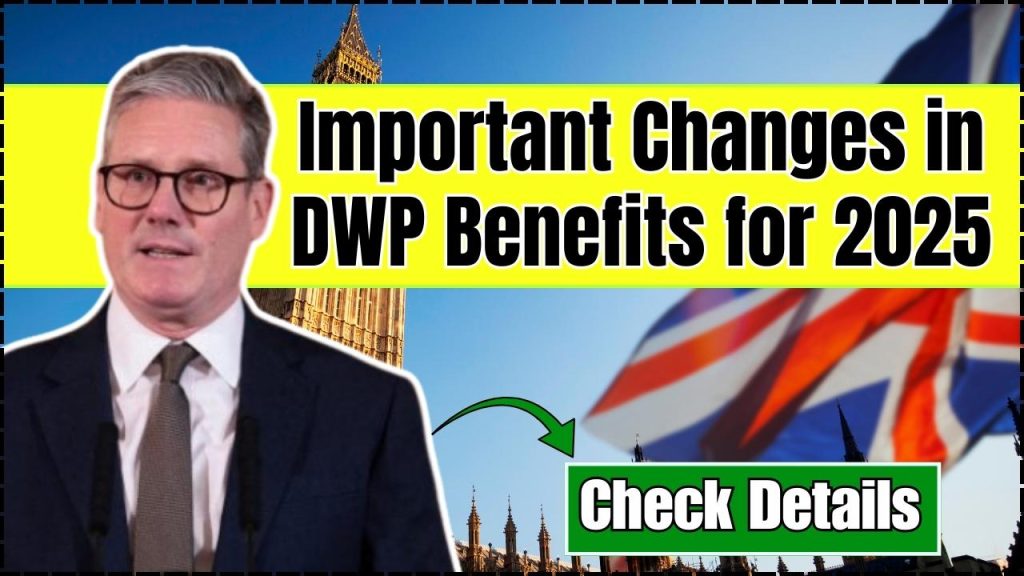
DWP Benefits for 2025: The UK Department for Work and Pensions (DWP) is making significant changes to the benefits system in 2025. These updates will affect millions of households, including low-income families, pensioners, carers, and disabled individuals. Understanding these changes is crucial for financial planning and ensuring you receive the correct entitlements.
In this guide, we break down the most important DWP benefits changes for 2025. Whether you’re receiving Universal Credit, Child Benefit, or State Pension, this article provides a clear, expert-backed explanation to help you navigate these updates. We also include practical examples, frequently asked questions (FAQs), and tips to make the information accessible and actionable.
Why Are These Changes Happening?
The UK government periodically adjusts welfare benefits to keep up with inflation, economic trends, and policy reforms. The DWP’s changes for 2025 are primarily driven by:
- Rising living costs and inflationary pressures.
- Adjustments to tax and national insurance policies.
- Encouraging work and financial independence for those receiving benefits.
- Reducing government expenditure on benefits while increasing targeted support.
These updates are expected to impact millions of claimants across the UK, making it essential to stay informed about how these changes could affect you and your family.
DWP Benefits for 2025
| Change | Details |
|---|---|
| Universal Credit Increase | Standard allowance for joint claimants aged 25+ rises from £617.60 to £628.09 per month. |
| State Pension Increase | Full New State Pension increases by 4.1% to £230.25 per week. |
| Universal Credit Deduction Limit | Debt repayment cap reduced from 25% to 15% of standard allowance. |
| Child Benefit Increase | First child: £26.04/week, additional children: £17.24/week. |
| Carer’s Allowance Earnings Limit | Increases from £151 to £181 per week. |
| Winter Fuel Payment Restrictions | Now limited to households receiving Pension Credit. |
| Managed Migration to Universal Credit | Legacy benefits to be fully replaced by March 2026. |
| Warm Home Discount Expansion | Includes 2.7 million additional low-income households. |
| Free Childcare Expansion | 30 hours of free childcare for working parents with children 9 months+. |
The DWP benefit changes for 2025 aim to support low-income families, pensioners, and carers while adjusting to economic conditions. With higher Universal Credit and pension payments, as well as expanded childcare and energy support, these updates will provide financial relief to millions of UK households.
Stay informed and check official government sources for updates to ensure you receive your correct entitlements.
Breakdown of Key Changes
1. Universal Credit Increase
From April 2025, Universal Credit payments will rise by 1.7%, in line with inflation. The new standard allowance for joint claimants aged 25+ will be £628.09 per month.
Example: A couple currently receiving £617.60 will get an extra £10.49 per month.
This increase helps offset the rising cost of living but may still be insufficient for many families struggling with rent, bills, and childcare expenses. Experts recommend budgeting wisely and checking if you qualify for additional support.
2. State Pension Increase
The State Pension is set to increase by 4.1%, meaning those on the full New State Pension will now receive £230.25 per week.
Example: Pensioners currently receiving £221.20 per week will see an increase of £9.05 per week.
For pensioners who rely solely on their State Pension, this increase is a welcome relief. However, with energy bills still high, older individuals may also benefit from Winter Fuel Payments and Pension Credit.
3. Reduction in Universal Credit Deductions
Previously, up to 25% of Universal Credit could be deducted for repayments (e.g., rent arrears, overpayments). From April 2025, this cap will be lowered to 15%, allowing claimants to keep more of their benefits.
Tip: If you have outstanding deductions, contact DWP to discuss flexible repayment options.
4. Child Benefit Increase
Child Benefit rates will increase as follows:
- Eldest/Only Child: From £25.60 to £26.04 per week
- Each Additional Child: From £16.95 to £17.24 per week
Example: A family with two children will receive an extra £4.28 per month.
5. Carer’s Allowance Earnings Limit Increase
The earnings limit for Carer’s Allowance will increase from £151 to £181 per week, meaning carers can earn more without losing their allowance.
DWP Confirms £175 Support for Pensioners Facing Fuel Payment Gap: Are You Eligible?
Claim Your £475 Bonus! DWP Releases Key Details for State Pensioners, Are you eligible to get it?
Frequently Asked Questions About DWP Benefits for 2025
Will my Universal Credit automatically increase?
Yes, the DWP will adjust your payment automatically in April 2025.
Do I need to reapply for Child Benefit?
No, existing recipients will receive the new rates automatically.
How do I check if I qualify for Pension Credit?
You can check eligibility and apply on Gov.uk.
When will all legacy benefits end?
By March 2026, all legacy benefits will be replaced by Universal Credit.











